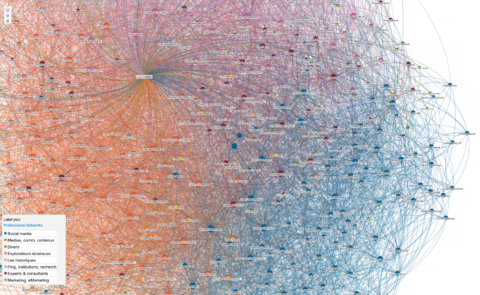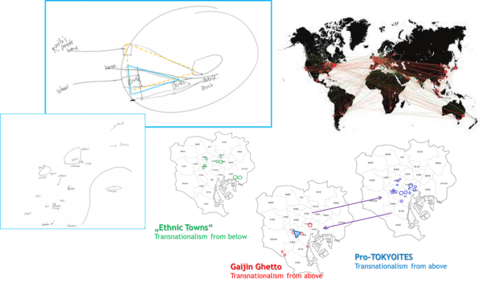Veranstaltungen und Aktivitäten
Workshop ‚Technology & Society in Japan and Beyond‘

Technical artefacts, technologies, and infrastructures are shaping our everyday life in manifold ways. At the same time, their development, promotion and/or rejection is influenced by cultural patterns, ethical principles, social values as well as power relations. This one-day workshop of the Research Initiative ‘Technology & Society in Japan and Beyond’ brings together scholars who share an interest in the analysis of co-construction processes of technology and society in Japan and beyond. Twelve speakers will address the themes ‚User, Visions and Technology Development‘ and ‚Ethics, Health and Technology in Context‘. The workshop takes place online on June 25 and is organized by Susanne Brucksch and Cosima Wagner (FU Berlin). Details and registration here
Gender & Sexuality series lecture on women in Japanese videogames

This presentation examines the representation of women in Japanese videogames, situating the depiction of female bodies in terms of political discourse. Focusing on the online card-based wargame Kantai Collection, it analyzes how attributes of Japanese warships are reflected in the physical characteristics of women. At the same time, Kantai Collection is highly political in its theme, representation of women, and enactment of war memories. This presentation examines the game and related artefacts as part of a popular politicization of WWII by Japanese artists, also seen in the recent spate of blockbuster revisionist films, as well as Nazi imagery and narratives in anime and manga. It argues that the hyper-sexualization of women in Kantai Collection contributes to the exoticization of war as distant and unreal, in a continued context of controversial war memories in Japan. This event is part of the DIJ’s lecture series ‚Gender and Sexuality in East Asia‘. Details and registration here
Speaker:
Rachael Hutchinson, University of Delaware
Live-stream Tokyo Olympics book presentation

DIJ deputy director Barbara Holthus and our alumni Hanno Jentzsch and Florian Purkarthofer as well as Wolfram Manzenreiter (all Japanese Studies, University of Vienna) will present their chapters from Japan Through the Lens of the Tokyo Olympics at a panel discussion and book presentation on June 23. They will be joined by Georg Spitaler (Association for the History of the Workers‘ Movement, Vienna) and Corina Gallmetzer (University Library, University of Vienna). The book is an outcome of the DIJ’s special project on the Tokyo Olympics and is available for free download (open access) on the publisher’s website. The event will take place online and can be viewed via live-stream. Details and registration here
Recovery Games under the Mask – Joint JDZB & DIJ panel discussion

Olympic and Paralympic Games last on average 34 days – the preparations of the host city, however, take years. The Games have a significant impact on the cityscape, politics, society, economy, and public discourse of its host city and country. To discuss social, political, economic, and historical aspects of the Games, the Japanese-German Center Berlin (JDZB) in cooperation with the DIJ hosts a virtual book talk and panel discussion, preceded by short input statements by DIJ researchers Sonja Ganseforth, Barbara Holthus, and Torsten Weber, DIJ alumnus Axel Klein (Duisburg-Essen University), and Wolfram Manzenreiter (University of Vienna). They have all contributed to the DIJ special project on the Tokyo Olympics and are authors of the recent publication Japan Through the Lens of the Tokyo Olympics (Routledge 2020, open access). The event will be moderated by Alastair Gale, Japan Editor at The Wall Street Journal. Details and registration here
Next DIJ Method Talk: Kaitlyn Ugoretz on digital ethnography

While emic definitions of Shinto often describe the ritual tradition as the unique “indigenous faith of the Japanese people”, such claims are troubled by the growth of a “global Shinto.” The confluence of Japanese strategies for repositioning the nation as being of global import over the last few decades have rendered Shinto attractive and available to non-Japanese people around the world. Based on several years of multi-sited digital ethnographic research, in this presentation Kaitlyn Ugoretz will examine the development of transnational, digital Shinto communities on social media over the last twenty years. She will conclude with a reflection on the importance of digital ethnography as method in response to obstacles to traditional research during a global pandemic. Details and registration here
Speaker:
Kaitlyn Ugoretz, University of California, Santa Barbara
DIJ Web-Forum on Data and Values in Japan and Germany

Data are widely considered to be the “oil” of the digital economy. But whereas the concept seems essential and ubiquitous, social, economic, and legal aspects associated with the meaning, ownership, exchange, use, and protection of data remain highly contested even among countries with similar economic and political systems like Japan and Germany. Our speakers will present the main legal regulations and public discourses related to the concept of data in Japan and Germany. In the discussion, we will try to pinpoint major differences in the understanding of data and their implications for the ownership, protection, use, and international exchange. Details and registration here
Speakers:
Axel v.d. Bussche, Taylor Wessing
Stefan Heumann, Stiftung Neue Verantwortung
Hitomi Iwase, Nishimura & Asahi
Koichi Sumikura , National Graduate Institute for Policy Studies (GRIPS)
moderated by Franz Waldenberger, German Institute for Japanese Studies
Public talk ‚Tokyo Olympics – An Uphill Battle‘ with Barbara Holthus

What are the latest developments and challenges that overshadow the Tokyo Olympics? Join DIJ deputy director Barbara Holthus, Olympic expert Vanessa Åsell Tsuruga, and special advisor to former Japanese Prime Minister Shinzo Abe, Tomohiko Taniguchi, for an online discussion of the risks and opportunities ahead and their impact on Tokyo and Japan. The event ‚Tokyo Olympics: An Uphill Battle‘ is hosted by the Japan Center at the Institute for Security & Development Policy (ISDP), a Stockholm-based non-profit and non-partisan research and policy organization. The webinar will be moderated by Jon Thunqvist, Senior Research Fellow at the ISDP, and takes place on Monday, 31 May, 10.00-11.00 (CEST) / 17.00-18.00 (JST). Registration is required via the ISDP.
First lecture of DIJ Method Talks series: Sakura Yamamura on Mental Mapping

The diversification in and of urban spaces through rising mobility is inevitable, yet the actual capturing of socio-spatial urban transformation is still methodologically underexplored. Based on the analytical framework of Löw (2001), Sakura Yamamura employed the novel methodological tool of mental maps in her research on global and local mobility patterns. She combined it with 45 interviews with transnational migrant professionals in Tokyo, ethnographic site surveys and geographical mapping. The mental maps were drawn by transnational professional migrants in order to capture the extent and locations of urban transformations. In this presentation, she will introduce the method of mental mapping and discuss how it can be connected to spatial theory to capture socio-spatial transformations and mobility patterns in Tokyo and beyond. This lecture opens the new ‚DIJ Method Talks‘ lecture series. Details and registration here
Speaker:
Sakura Yamamura, Max Planck Institute for the Study of Religious and Ethnic Diversity





 Open Access
Open Access 
